Teaching
Teaching by the Professorship of Learning Sciences and Educational Design Technologies aligns with our research at the intersection of learning sciences and design and builds on the most recent understanding of how people learn. Across our teaching, the principal aim is to support students' independent and critical thinking, domain knowledge learning, and recognition as contributors to addressing pressing societal issues.
We contribute novel instructional concepts to courses of ongoing study programs at the Department of Educational Sciences and beyond. We also offer supervision on bachelor's and master's theses. Please contact our team for more information.
Completed theses
Here is a list of our completed theses, if you are interested in writing a thesis in our lab, please check the Master Theses opportunities page.
- Villarreal Bermúdez, D. (2024). Making a doll skirt: Opportunities for practicing spatial skills with crafting. [Master Thesis]. Technical University of Munich.
- Calisir, H. (2023). Undergraduate performance of equilibrium through design with everyday materials: Working toward an assessment using one group pretest-posttest design. [Master Thesis]. Technical University of Munich.
- Xu, X. (2023). Analysis of Learning Diaries for Equilibrium Learning Processes through Designing with Everyday Materials. [Master Thesis]. Technical University of Munich.
- Ukwu, U. P. (2023). An Exploratory Study of DIY pneumatic machine and e-textile instructional YouTube Videos for STEM Education. [Master Thesis]. Technical University of Munich.
- Hurtado, S. (2022). Sound Making with Tangible Personal Artifacts and Electronic Construction Kits to Foster Engineering Practices. [Master Thesis submitted for publication]. Technical University of Munich.
Courses
Learning Sciences Apprenticeship (LV 0000004037; 0000002662)
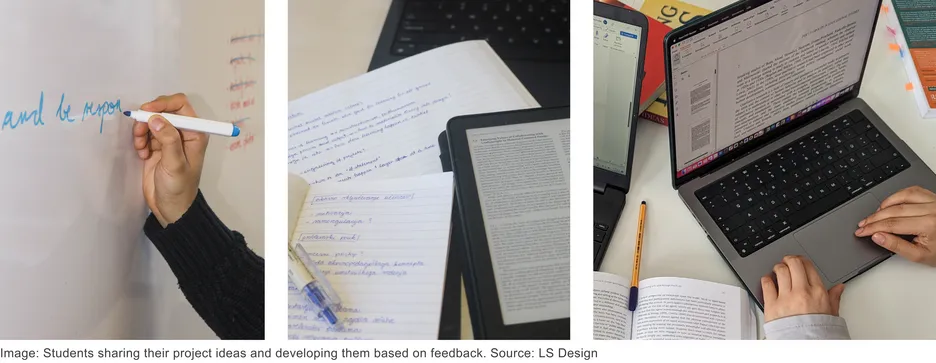
Learning sciences apprenticeship is a place for students to learn the tricks of the trade in the learning sciences and especially the communities that the work relates to. This can involve engaging with guest speakers and organizing community service events, such as workshops of novel learning activities designed at the professorship. Students will take part in and be responsible for research and teaching within the Professorship for Learning Sciences and Educational Design Technologies as well as the LS Design Lab. During apprenticeship, students can share work in progress and practice receiving and providing feedback to each other. Students can share work in progress in the form of written paragraphs and pages, an outline of a paper, a presentation of a thesis or dissertation idea, a conference paper, a journal article, a book chapter, a course paper, or any other meaningful format. We will also use this session to develop shared theoretical and methodological foundations as we discuss work in progress, and student's plans for self-study and development.
Tangible Computational Design for Learning (SOT10032)

Tangible design technologies for learning present an opportunity to broaden participation in STEM+C contexts and to introduce challenging concepts to students at an early age through the design of personally meaningful projects. The design of effective Tangible Technologies for Learning requires competencies at the intersection of educational sciences, computer science, design, and educational technologies. This project week course examines research in Tangible Design Technologies in relation to how people learn, and has a special focus on designing new tangible computational experiences that support learning in STEM+C fields by building on state-of-the-art learning theory. It is designed as a student-centered project-based learning experience, where participants will tinker and design with the latest construction kits (e.g., electronic textiles, Chibitronics paper circuits, and Playtronica) through guided activities in heterogeneous small groups and conduct a final project. Overall, students will be empowered to reflect on the design of educational technologies for impacts on learning outcomes and participation, and to recognize underlying assumptions of learning in educational technologies.
Course lead: Prof. Dr. Anna Keune, Prof. Dr. Tilman Michaeli, TUM School of Social Sciences and Technology
This course was a part of the project Tangible computational design for learning.
Project Seminar (LV 0000005417)
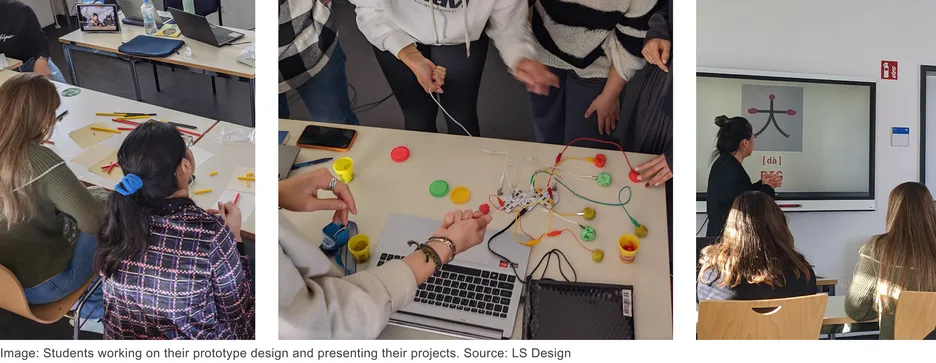
In the project seminar course, students will engage in developing their own research project from start to finish. Students will have the freedom to choose a topic from educational research that fits their personal interest and develop this topic into a full research project - starting with the decision of what to investigate, conducting a literature review, formulating a research question, identifying an appropriate research design, collecting and analyzing data, presenting the results, and reviewing the process through reflective presentations. Students will work in groups. We will asist students in finding a method of investigation that is feasible for their individual competencies and the project seminar (e.g., peer-surveys, interviews, observational studies, use of publicity available data).
Analysis of Interview Data, Learning Journals, and Portfolios (LV 0000000628)

Analysis of interview data, learning journals and portfolios provides an overview of qualitative methodology in educational research. The course aims (1) to assist students' understanding of the principles, aims and methods of qualitative research; (2) to present qualitative analysis tools and software; and (3) to prepare students for further study and engagement in qualitative research. To meet these aims, the course offers students to familiarize themselves with qualitative research studies in education and to become aware of advantages and disadvantages of qualitative research. The course provides students with knowledge about a range of qualitative research methods and the qualitative research process. Throughout the course, students will begin their own research project, by planning and conducting semi-structured interviews and analyzing collected data using qualitative data analysis software. Students will present results of their research.
Scientific Writing (LV 0000000600)
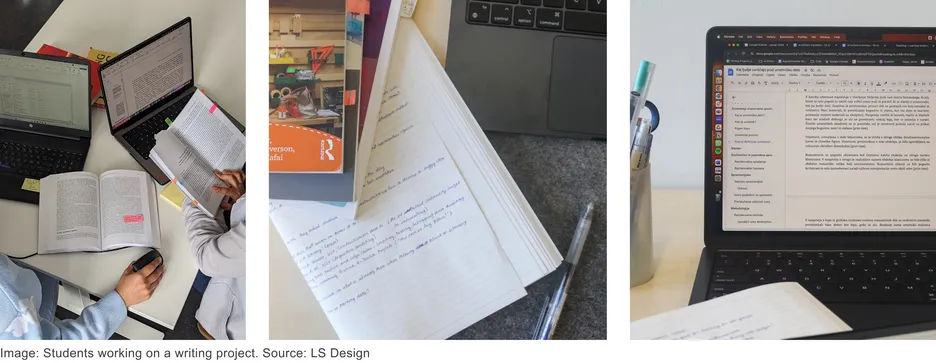
Scientific writing is a skill that needs to be trained. Writing scientifically means telling a story of new knowledge in a well-structured, clearly described, and convincingly framed way. The goal of this course is to support students in kick-starting the writing of their Master's Thesis. The course will build on the students’ understanding of basic scientific writing and provide additional opportunities to write, receive and provide feedback, and re-write a research proposal. The course will guide students to decide on a research topic and formulate adequate research questions. Additionally, the course is targeted to support students to develop a structure and a plan for a realistically achievable research study, such as a Master Thesis. We will talk about and practice what is necessary for a successful thesis. The course will also address aspects of tailoring writing to an audience, and will discuss and practice writing strategies and resources that support developing personal and productive writing habits.
Basic Scientific Writing (LV 0000002353)

Basic scientific writing is part of the module on writing and presentation skills that aims to support students in learning how to make information accessible for researchers. Basic scientific writing offers students to obtain foundational skills for scientific work related to the presentation of information in educational scientific manuscripts. The course provides an introduction to (a) types of scientific manuscripts and their structure, (b) principles of scientific manuscripts and features of specific sections, (c) finding relevant literature, (d) the writing process, and (e) the publication and review-process. To meet these aims, the course offers opportunities for students to write and structure their own scientific texts on a high academic level and to apply knowledge about academic writing to their own work. Scaffolded writing and reviewing activities are designed for students to develop academic argumentation competencies and to acquire differentiated foundational knowledge and skills of scientific writing related to research on teaching and learning.
AI Ethics in Educational Technologies (LV 0000004119)
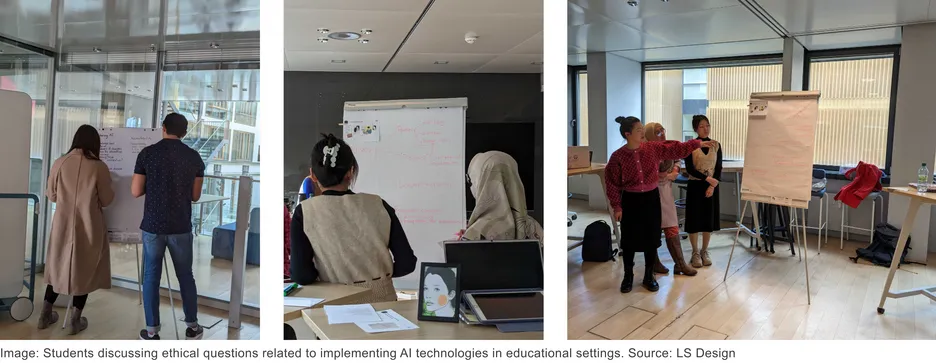
Various AI-based technologies are entering the world of education (“AI EdTech”) at an accelerating pace. The introduction of AI EdTech comes with the promise to improve student learning and to support teachers in their practices. However, implementing AI EdTech in classroom settings comes with numerous challenges, such as significant ethical and legal risks ranging from bias to threats to privacy. Additionally, ethical questions specifically related to teaching and learning can arise. We need specific tools to support teachers to make informed decisions on how to use AI EdTech best within their classroom based on their affiliated risks and ethical considerations. An interactive risk assessment dashboard can provide the needed support by offering teachers and students a navigation aid for managing connected ethical risks when implementing AI in education, and help unlock AI’s potential for learners.
This course was a part of the project Co-designing a Risk-Assessment Dashboard for AI Ethics Literacy in EdTech.
Tragwerkslehre 1 (LV 0000001174, ED12005 Building Structures 1)
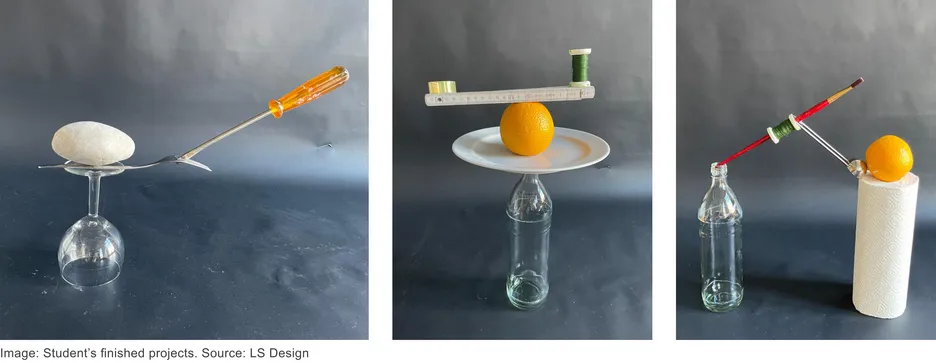
The Professorship of Learning Sciences and Educational Design Technologies contributed to innovative cross-campus teaching by collaborating with Prof. Dr. Pierluigi D’Acunto in the introduction of a structural architecture design activity. During the activity, students create structural models using everyday materials to experience and deepen their understanding related to three key concepts of equilibrium, stacking, cantilevering, and spanning. The Professorship of Learning Sciences and Educational Design Technologies led the design of a pre/post survey and a learning diary to assess student learning processes. Two Master Students are working on their Master Thesis as part of this engagement.
Course lead: Prof. Dr. Pierluigi D’Acunto, Professorship for Structural Design, TUM School of Engineering and Design
Experiment tutor: Sebastian Dietrich, Professorship for Structural Design, TUM School of Engineering and Design